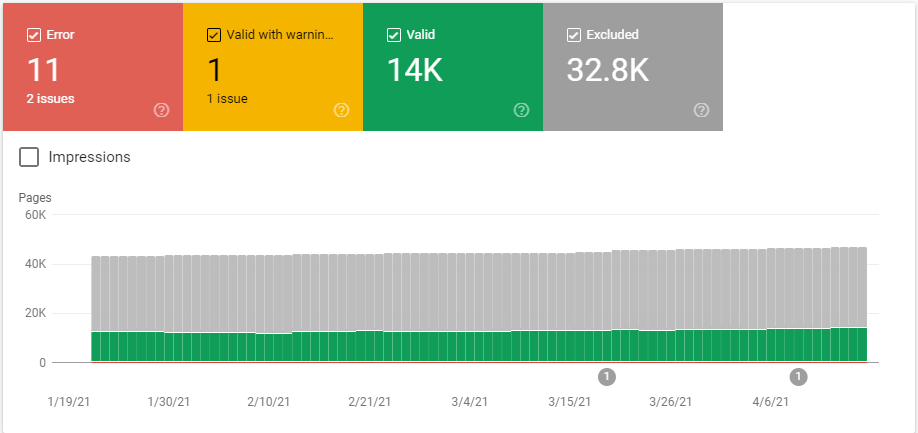
How Google Search Indexes Your Website
Understand the benefits of Google Search Index
Google is where millions across the globe turn first for their questions, big or small. If they are lucky, they typically find them within the first few results shown. That is why websites that are on the top of Google’s search engine results pages (SERP) grab around 40% of the traffic missed by lower-ranked websites.
According to Statista, in February 2021, the online search engine, Bing, accounted for 6.7% of the global search market, while the market leader, Google, had a market share of 86.6%, and the Chinese search engine, Baidu’s, market share was 0.54%.
These numbers show that throughout the world, 9 out of 10 people go to Google when conducting any type of search on the internet. This means that you should indeed be aiming your SEO strategy towards hitting that first page of Google Rankings! A way to start this process is to make sure your website pages are submitted through the Google Search Index.
If your website is not in the database of the Google Search Index, then you are pretty much invisible to the online world and more importantly, your target audience. You will not show up for any search queries and you will not receive any organic traffic whatsoever.
Given that you are reading this blog, we are assuming this is not news to you. So, let us break it down and learn how Google indexes your website.
First, What is Crawling and Indexing for Google?
Google continuously discovers new web pages by crawling the web, and they add those pages to their index. And all of this is done by using a web spider or Googlebot.
Crawling: This is the process of following hyperlinks on the web to discover new content and web pages.
Indexing: Once a bot or spider has crawled the web page it will then store that page in a very vast database.
Web Spider: A piece of software designed to carry out the crawling process.
Googlebot: Google’s web spider.
When anyone Googles something, they are looking for Google to then return all relevant pages from their index. Because there are millions and millions of pages that fit their search query, Google’s ranking algorithm does its best to sort the pages so that you will be presented with the best and most relevant web pages first.
There are several quick ways to check whether Google has indexed your website, or whether they are still stuck in the preceding phases of discovery and crawling. Use the Google Search Console’s Index Coverage Report to get a quick overview of your website’s indexing status. This detailed report provides feedback on the more technical details of your site’s crawling and indexing process.
Now that you understand how Google Search Index works with crawling, indexing, and spiders, we must talk about your sitemap.
How a Sitemap helps Google Search Index your Website
A site map is a list of all the pages (URLs) on a website. The file is used by search engines as an overview of all available content as well as a way to better understand the structure of the website.
Having a sitemap submitted that is constructed with a clear goal in mind could be the driving factor to a website’s success. It will provide a vital link between a website and a search engine that nurtures the relationship that is vital to the website’s success. A well-structured sitemap will make a website searchable by all search engines and provide your users with more accurate search results when they are looking for keywords that are related to your website. The site crawlers used by the search engines depend on sitemaps to help point them in the direction of the correct website that the user is searching for.

“A well-structured sitemap will make a website searchable by all search engines and provides your users with more accurate search results when they are looking for keywords that are related to your website.”
Benefits of Submitting a Sitemap
There are many benefits of using a sitemap. Not only does it make it easier to navigate, but it gives it better visibility to search engine crawlers. Sitemaps can offer the opportunity to link search engines with any changes made to the site immediately after they happen. Additionally, when there is a sitemap link to a website, and it is submitted to search engines, you will not have to rely on external links as much when search engines are bringing visitors to your website.
To learn more about sitemaps, read our blog- What is an XML Sitemap and Why Should You Have One?
As a Website Design Company, Spectrum Net Designs, understands that a SEO Strategy can be a full-time job! If you are looking for more insight about SEO Marketing, we would love to see how we can help! Contact Us today and one of our marketing professionals will assist you.
Connect With Us
Categories
- Blogging
- Branding
- Content Management System (CMS)
- Content Marketing
- Custom Website Development
- E-Commerce
- Events
- Facebook Advertising
- Google Indexing
- Holiday
- Logo Design
- Marketing
- Mobile Friendly Website
- Mobile Responsive Design
- New Website
- Newsletter
- Online Directories
- Online Marketing
- Reputation Management
- Search Engine Marketing
- Search Engine Optimization
- Search Engines
- Social Media
- Social Media Advertising
- Submit URL to Google
- Website Design
- Website Maintenance
- Website Security
- WordPress Website Development